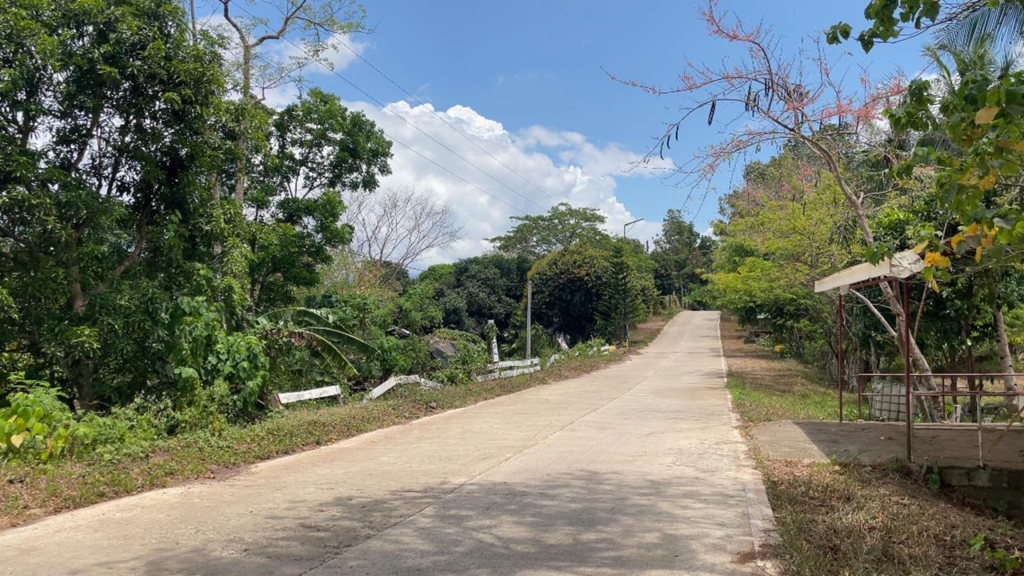Bacungan CBFM Aims for Diversified Future, from Waterfall to Rattan
By John Vincent Colili

A small waterfall in the CBFM area of C3MC in Candes III, Bacungan, Puerto Princesa City. This now serves as one of the sources of water for barangays in the city’s northeast.
BACUNGAN, Puerto Princesa City – As climate change has become increasingly evident in recent years, this has been translating to prolonged droughts, erratic rainfall patterns, and heightened water insecurity for regions already grappling with scarcity issues.
In Puerto Princesa, growing water demands and increasing climate variability evidently exacerbated planning dilemmas for the local water utility, pushing it to diversify and expand across various water sources in the city.
One of these recent expansions can be found in the community-based forest management (CBFM) area managed by the Candes III Marketing Cooperative (C3MC). The current chairman of the CBFM, Joel Germina, is proud that the forest they’ve strived to nourish and protect for so long now provides water for many barangays in Puerto Princesa’s northeast.
“Mayroon naman kaming falls na nandoon sa taas, kaso lang kinuha sya ng [Puerto Princesa City] Water District para magamit yung tubig dito sa kabayanan, sa Barangay, pati yung city tumulong din na para magkaroon ng patubig papunta ng Barangay Bacungan, kasi yung barangay medyo naghihikahos nga ngayon sa tubig” said Germina.
The C3MC is a modest community-based cooperative that prioritizes livelihood-related activities, particularly those related to the production and marketing of rattan poles and rattan-based handicrafts. The cooperative manages a CBFM area covering 463 hectares in hilly and forested regions of Barangay Bacungan, a rural barangay situated in the central part of Puerto Princesa.
The cooperative emphasizes the importance of the CBFM area for environmental conservation and sustainable forest management. The cooperative also makes efforts to rehabilitate and maintain the forest to prevent degradation and protect the watershed located on the site, even though these efforts are not favorable to some community members, specifically those that do illegal activities in the forest.
“[Naging] kaaway kami ng community, since kasi na-approve yung CBFM, yung mga tao dito, halos yung kanilang livelihood, hanapbuhay ay nasa gubat. Nung na-approve yung CBFM, alam natin yung batas, bawal na yung pagbabawas ng mga puno, ang kailangan natin i-rehab or i-maintain yung dati” said Nene Camacho, the current project manager of the cooperative.

Chairman Joel Germina (2nd from the right) and Nene Camacho (middle) with the BOD and members of C3MC.
The C3MC is one of the numerous partners of the ASSERT-CBFM project in Palawan. At the onset of the cooperative’s partnership with the ASSERT-CBFM project, they had huge plans to expand their operations, particularly on the rattan enterprise. The ASSERT-CBFM project provided financial support for the processing of the cooperative’s Community Resource Management Framework (CRMF) and Resource Use Permit (RUP). Nene Camacho, highlighted how pivotal the financial grant from ASSERT-CBFM was on the processing of their CRMF.
“Nagka-utang-utang kami para lang ma-approve yung CRMF namin, kaya nagsulat kami sa ASSERT-[CBFM] na ida-divert namin yung budget [na binigay] kung pwede kasi wala nang kami mapagkuhaan ng pera. Pinayagan naman kami na ida-divert namin yung pera na bayad namin doon sa inventory para doon sa rattan inventory na para ma-process na” said Camacho.
However, delays in the approval of the CRMF have resulted in the stagnation of the project’s progress, causing frustrations among the cooperative’s members. Chairman Germina expressed disappointment that the assistance from ASSERT-CBFM, intended to support their project, has been hindered by these bureaucratic obstacles.
“Binigyan kami ng kaunting tulong para maaayos yung mga papelis na kinakailangan namin para sa project namin sa rattan. Ngayon, yung aming papers na kailangan, yung permit namin yung aming CRMF ang tagal talaga bago lumabas” said Germina.
Camacho also added that the warehouse they’ve constructed with support from ASSERT-CBFM to augment their rattan enterprise is already dilapidating but is still unused since they are not yet allowed to harvest rattan from their CBFM area due to a lack of permits.
“Ang problema, ang bodega, matagal na nakatayo, magbubulok na lang, wala pang ratan. Kasi wala pang, hindi pa-approve yung aming CRMF.”

Scenic road in Candes III, near the access road to C3MC CBFM site.
Despite the setbacks, the C3MC remains committed to the CBFM project and its goals of environmental protection and sustainable livelihood development. Proactively pursuing innovative solutions and forging partnerships, they aim to enhance their strategies and diversify their income streams, thereby amplifying their impact on community well-being.
The story of the C3MC highlights the need for streamlined bureaucratic processes to ensure the timely and efficient support for community-based initiatives that address environmental concerns and promote sustainable economic growth. Through enhanced collaboration and simplified processes, the CBFM project in Bacungan holds promising potential to effect substantial positive change, both within the forest ecosystem and across the broader community landscape.
ASSERT-CBFM was a 32-month project funded by the Forest Foundation Philippines, aiming to enhance Community-Based Forest Management (CBFM) in relation to Nationally Determined Contributions (NDCs) in the Philippines. The project focused on assessing, engaging, and building the capacity of CBFM stakeholders through collaborative learning and knowledge exchange. It also aimed to formulate and elevate policy recommendations to national mechanisms on NDCs. Implemented by NTFP-EP Asia and its partners, the project ran from 2020 to 2022. ASSERT-CBFM 2, a nine-month continuation, documented lessons from CBFM organizations that received small grants for ecosystem-based adaptation and green business initiatives, awarding a total of PhP1,850,000 to ten organizations.



